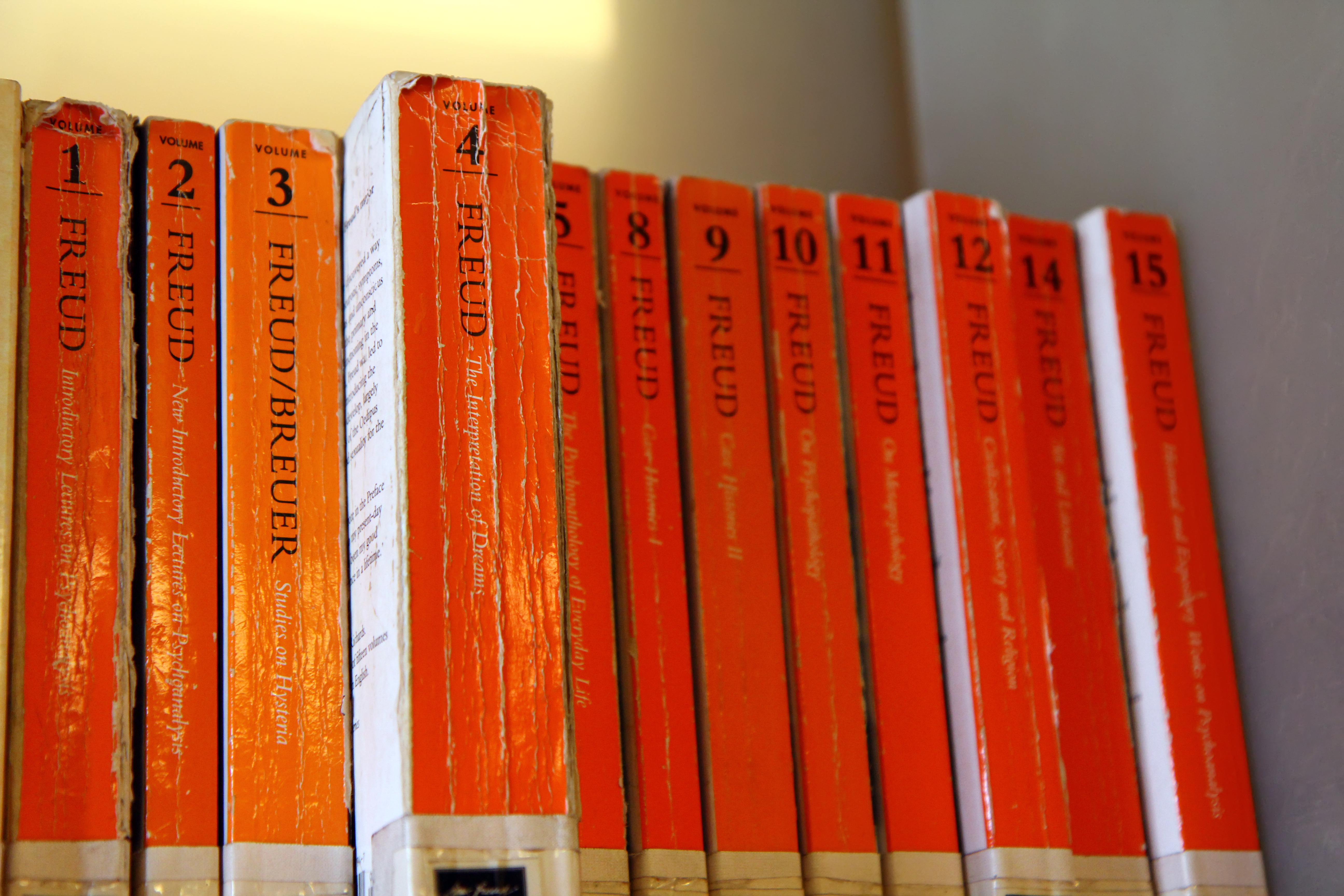Reading Freud today
Psychoanalyst and writer
- Reasons for reading Freud: he reveals how incredibly imaginative and intelligent we are in our suffering, and his texts are very evocative.
- Freud has fallen out of favour for many reasons: he became notorious for being interested in sex. Also, feminism found him oppressively patriarchal.
- Freud helps us make sense of our lives because he sees us as essentially meaning-making animals.
- Freud is trying to help us be less terrorised by the complexity of our own minds.
Why read Freud today?

Photo by sasimoto
I want to answer the question, to begin with, by talking about trauma. This might seem a bit odd, but I hope it will soon make sense. When we have a traumatic experience, two things happen to us. One is that we close down, that we’re in shock. The other thing is that we find ourselves repeating the trauma, as in going over it in our minds or going back to the traumatic situation. It’s like a stun to our attention. For a lot of people at the turn of the century and indeed in the 1950s in America, reading Freud was like a benign trauma: they had the experience that we’ve all had in different ways, which is they came across Freud’s writing and were amazed by how interesting, illuminating, intriguing and fascinating it was. It was similar to a benign trauma in the sense that what happened was that many people became Freudians. They couldn’t interpret it, they couldn’t translate it enough, so it was as though they became followers rather than readers. I think one of the things that’s put people off reading Freud is the way in which he creates a following. So, there are too many Freudians and too few interesting ideas about Freud around.
Today might be a very good time to start reading Freud because, in a way, Freud has fallen out of favour. It means there’s no pressure or coercion on anybody to assume this is great writing or of any interest at all. You can read it out of curiosity, knowing or not knowing the history that preceded your reading of it. One of the things that strikes people who read Freud now is that he’s very un-dogmatic and he’s very accessible. In other words, this is not esoteric, complicated writing. There isn’t a vocabulary that’s difficult to learn. It’s very hospitable. He’s also very exploratory. He’s not telling us the truth about sex, dreams or the unconscious – he’s constantly saying, ‘This is what may be true’ and ‘This is a possibility.’ Freud illuminates many areas of our lives without telling us what to think. In a way, he allows us the complexity of our own minds. His project in the writing is not to narrow our minds but to open them up.
I would encourage somebody to read Freud for two main reasons. One is that he reveals how incredibly imaginative and intelligent we are in our suffering; our suffering is a form of communication, a way of making meaning and of talking to somebody else. Freud has an account of what are called “symptoms” that make them like works of art. They are an attempt to communicate something. So, there’s a real commitment in Freud to a human community of mutual interpretation. The second reason to read Freud is that they’re very evocative texts. On the one hand, he informs you of the way he wants you to think about the mind and about a life, but in the reading of these texts, you will find yourself having your own thoughts. It’s strangely atmospheric. It’s strangely medium-like as a way of writing, and very simple.
Fallen out of favour
Freud has fallen out of favour for many reasons. In one sense, he became notorious for being interested in sex, which took off in the culture in a rather oversimplified way because Freud does not present himself as an expert on sexuality. Freud says that sexuality is interesting and meaningful in ways we haven’t thought of before, so he elaborately redescribes it. Very quickly, two things happened: one was that – and this was true – feminism found Freud oppressively patriarchal. In other words, it was very much a male view of female sexuality and indeed of male sexuality, so there was something already potentially narrowing about it. To a lot of people, it felt to be more of the problem rather than an answer to the questions.

Photo by Africa Studio
Secondly, what’s notable about Freud is that he has very mixed feelings about things. For example, he’s extremely interested and interesting about homosexuality. On the one hand, he claims sexuality takes many forms, one of which, of course, is homosexuality. There’s another Freud who is more official and officious, who says that there is a “normal” way of developing. To be gay, therefore, is to be developmentally arrested. That is, you can get stuck at a stage of being gay as though being gay was a defence or a protection against being heterosexual, whereas it’s quite clear that being heterosexual could be a defense against being homosexual. He offended a certain range of people, quite understandably.
Another reason Freud fell out of favour was because it was a too narrowly individualistic account of a life. He didn’t take into account the pressure of economics and politics, and the power of a culture that one lives in. It was as though people felt this was a very reductive account of what a life is, as it didn’t take into consideration enough variables. It was as though you could describe a life in terms of psychological development within a family as opposed to being more mindful of the ways in which the family exists in a wider culture.
Making sense of our lives
Freud helps us make sense of our lives because he sees us as essentially meaning-making animals. He sees a life project as, in a sense, the attempt to make sense of a life, to understand why one does what one does and why one might want what one wants. In the doing of this, Freud has an account of what the narrative of a life might be. It’s essentially a developmental story; for Freud, what is essential is that we were once babies, that we grow through various stages of development to become the adults we are, and that none of these developmental stages are superseded. They’re all incorporated. It’s an inclusive developmental story about a life. It also shows us how, in a way, we are continuously trying to make meaning by presenting other people with symptoms, jokes or slips of the tongue as though we’re appealing to other people for responses, as though much of our communications are like probes. If I was to make a Freudian slip talking to you now, you might have a thought about why I made that slip. It’s as though when I make the slip, I’ve got two intentions: one is what I intend to say to you and the other is what I happen to say to you. At that moment, we can think, well, there’s clearly more to this communication than I was aware of or there was more I wanted to say. Freud is giving us a language to make sense of our lives. The question then is, why do we want to make sense of our lives? Or what are we wanting in trying to make sense of our lives?
Being psychoanalysed versus reading Freud
I believe no one can legislate about this. Psychoanalysts have obviously had an investment in saying you only know what it’s really like if you have psychoanalysis, but I think that’s debatable. People can have different experiences. Anybody can try reading Freud and see what effect it has. It may lead them to think that they’re curious about undergoing psychoanalytic treatment. But you can’t generalise. If you want to know what being in psychoanalysis is like, you have to be in psychoanalysis. If you want to find out about reading Freud, you should read Freud. They may overlap and they may not, depending on your sensibility and your project.
Fearing your own mind

Photo by Platonic
A lot of people are frightened of what’s going on in their minds, or of being mad, or of feeling and thinking things that they would rather not feel. It’s essential to Freud’s system that we repress things because they disturb us, so if we then unrepress things, we will be disturbed. But Freud is trying to help us be less terrorised by the complexity of our own minds. He is saying, there’s a sense in which we’re all what we call mad, but we needn’t all be terrorised by the complexity of ourselves. We needn’t all be terrorised by sexuality or by our aggression. There are ways of describing and redescribing these feelings and desires that might make them more viable, more plausible, more bearable, more enjoyable. One of the things that’s easy to forget is that Freud is also on the side of our enjoyment. He’s not trying to terrorise us with who he thinks we are; he’s also interesting us in the possibility of things being more enjoyable than we may realise, because one thing that people tend to underestimate about psychoanalysis is that it’s not only that you’re going to discover disturbing things about yourself, you might discover very pleasurable, exciting, interesting things about yourself. So, if one of the projects in psychoanalysis is self-knowledge, it’s misleading to assume that all the news is bad news. The good news is that we have capacities to enjoy things that we’re otherwise frightened of. There’s a character in one of Norman Mailer’s novels who says, ‘You learn everything fighting your fear.’ Freud encourages us to take risks, to be able to bear a bit more suffering with a view to more pleasure. He wants us to be interested in our lives, as opposed to being cowed, humbled or diminished. He wants us to find out who we might be and also who we want to be in relation to who we might be.
'Civilisation and its discontents'
If we’re going to start reading Freud now, it’s very important not to be daunted by how much there is. People should feel free to dip into things. I would recommend the essay called ‘Civilization and its Discontents’. Also, the short book called Three Essays on the Theory of Sexuality. The short book On Dreams, too, and there’s a longer book called On the Psychopathology of Everyday Life.
What I get from reading ‘Civilization and its Discontents’ are two things: one is that Freud says there’s no way we can avoid being discontented in civilisation, because when we live in groups and live in cultures, it involves us sacrificing some of our desire. So there’s going to be a level of frustration that’s unavoidable. But the advantage of living in a group is that we have all the resources of the group to help us deal with the difficulties. There’s something intrinsically unhappy-making about living in societies and, in a way, it seems to me it’s useful to know that because it offsets unrealistically utopian ideas about how we might live. In other words, it says there’s going to be a certain degree of frustration built into the way a life is. But the question is, what do you do with your frustration? What do you make of your frustration? Instead of asking how we can eradicate it or abolish it or experience it less, he’s almost asking, how can we experience it more such that it might be an inspiration rather than a saboteur?
Three essays on sexuality
The reason to read Three Essays on the Theory of Sexuality is that Freud gives us quite a new language for talking about sexuality. First of all, he shows us the sense in which sexuality begins in childhood, or something akin to sexuality begins in childhood. He also shows us how it develops – what he calls infantile sexuality – in which the child has a sensuously charged body. Then there’s what he calls a latency period, when it’s as though the sexuality goes underground, and then puberty, when all the desires of infancy are recovered, but with a clearly more sexual charge. Freud’s giving us a developmental story about how we might think about sex. He is also very interesting in the way he talks about what he calls sexual perversions. In other words, there’s a story of so-called normal sexuality in which people develop into heterosexual desiring creatures, and everybody knows that their desire is more complicated than that. So the people on the one hand develop so-called perversion. There are versions of sexuality that might trouble them, but they find not straightforwardly heterosexual reproductive sex very exciting. So Freud’s addressing the question, why does sexuality take so many different forms and how has it come about that we use sexuality to do so many different things? He’s showing us what he calls the plasticity of sexuality, that it can be used and exploited for many different developmental projects. It’s almost as though he opens this up as a conversation, because towards the end of the book he says, ‘I’ve written 130 pages on sex, and yet we still haven’t got a theory of sexuality. I don’t know what it is.’ And so, in a way, what Freud does is he starts a conversation.
Keeping Freud Alive
The best thing that happened to Freud was that he was interpreted by some of his more interesting followers. In other words, they didn’t simply take it as dogma or as information and then reproduce it. They actually interpreted it. They read it and made something of their own out of it. That’s what will keep Freud alive. Everybody would differ about this, but I think the most interesting readers of Freud are, in France, Lacan and Pontalis and Laplanche. In England, I would say Winnicott, Melanie Klein and Fairbairn. There’s a whole diversity of readings of Freud, of people who use Freud to realise their own psychoanalytic project, and in some ways the most interesting thing that can be done with Freud is that he’s redescribed with different projects in mind.
What keeps me reading Freud is the effect of all the literature that I love and value, which is that every time I read it, it’s as though I’m reading something new. It feels inexhaustibly interesting. It’s something about myself and my history, presumably. When I read Freud, I don’t read him diligently, dutifully or to learn to be able to reproduce his theories in public. It’s similar to a recurring dream – there’s something in that writing that goes on engaging me, even though I often don’t know what it is. When I reread a Freudian text, I find it interesting, enlivening and stimulating. I don’t reread Freud as part of my professional ongoing training. I reread Freud because I find him incredibly evocative and also a very consoling and inspiring voice. There’s a patience in Freud and a muted visionary quality that I find very, very enlivening.
Discover More About
Psychoanalysis and Freud
Phillips, A. (2019). In Writing. Penguin.
Phillips, A. (2016). Becoming Freud: The Making of a Psychoanalyst. Yale University Press.
Phillips, A. (2002). Promises, Promises: Essays on Literature and Psychoanalysis. Faber & Faber.